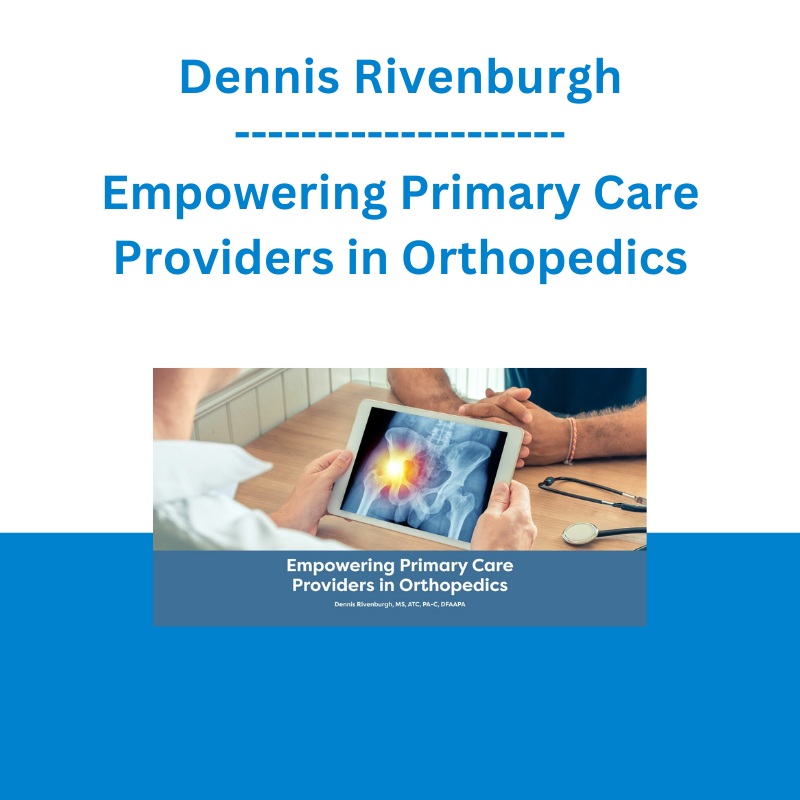*** Proof of Product ***
Exploring the Essential Features of “Dennis Rivenburgh – Empowering Primary Care Providers in Orthopedics”
Speaker: Dennis Rivenburgh, MS, ATC, PA-C, DFAAPA
Duration: 2 Hours 03 Minutes
Format: Audio and Video
Copyright: Apr 12, 2024
Media Type: Digital Seminar
Description
Gain expertise in diagnosing and managing orthopedic conditions commonly encountered in primary care, including mastering imaging techniques, splinting procedures for upper and lower extremities, making informed referrals to orthopedic specialists, and effectively implementing non-operative treatment strategies. This course equips you with the tools to provide top-notch orthopedic care within a primary care setting.
Speaker
Dennis Rivenburgh, MS, ATC, PA-C, DFAAPA, is a physician assistant who provides medical care to patients in the outpatient setting. Have provided first assist in surgery, with a specialty in orthopedics and sports medicine. Dennis has been a Certified Athletic Trainer for over 30 years. He also serves as an expert witness, both in defense and plaintiff cases.
Speaker Disclosures:
Financial: Dennis Rivenburgh has employment relationships with Johns Hopkins School of Medicine, the University of Maryland Baltimore, and ExpressCare Urgent Care Centers. He receives a speaking honorarium and recording royalties from PESI, Inc. He has no relevant financial relationships with ineligible organizations.
Non-financial: Dennis Rivenburgh is a distinguished fellow member of the American Academy of Physician Assistants, a fellow member of the American Academy of Physician Assistants, the Physician Assistants in Orthopedic Surgery, and the Academy of Physician Assistants in Legal Medicine.
Objectives
- Thoroughly assess various orthopedic conditions and select appropriate imaging modalities for orthopedic assessments, enabling accurate diagnosis and interpretation of diagnostic studies in primary care settings.
- Identify when splinting and immobilization is necessary for optimal patient comfort and injury management within a primary care context.
- Differentiate between cases requiring referral to orthopedic specialists and those amenable to non-operative management, equipping you to provide effective, patient-centered care for common orthopedic conditions in primary care practice.
Outline
Introduction to Primary Care Orthopedics
- Overview of the role of primary care providers in orthopedic care
- Common orthopedic conditions encountered in primary care
- The importance of early diagnosis and appropriate management
Diagnostic Skills in Orthopedics
- Selection and utilization of imaging modalities
- Interpretation of diagnostic studies (X-rays, MRIs, CT scans)
- Identifying key indicators for accurate orthopedic diagnoses
Referral Decision-Making
- Criteria for determining when to refer patients to orthopedic specialists
- Communication and coordination with orthopedic colleagues
Non-Operative Management of Orthopedic Conditions
- Pharmacological interventions
- Physical therapy and rehabilitation strategies
- Patient education and self-care for orthopedic conditions
Case Studies and Practical Application
- Analyzing real-world cases from primary care practice
Target Audience
- Nurse Practitioners
- Physician Assistants
- Physicians
- Nurses
- Other clinicians who provide primary care
Please see the full list of alternative group-buy courses available here: https://lunacourse.com/shop/










 Greg Loehr - Advanced Option Trading With Broken Wing Butterflies
Greg Loehr - Advanced Option Trading With Broken Wing Butterflies  Julie Stoian & Cathy Olson - Launch Gorgeous - Funnel Gorgeous Bundle
Julie Stoian & Cathy Olson - Launch Gorgeous - Funnel Gorgeous Bundle  The Daily Traders – Exclusive Trading Mentorship Group
The Daily Traders – Exclusive Trading Mentorship Group  Ed Ponsi - Forex Trading
Ed Ponsi - Forex Trading  Matan Feldman - The 13-Week Cash Flow Modeling - Wall Street Prep
Matan Feldman - The 13-Week Cash Flow Modeling - Wall Street Prep  Matthew Kratter - Trader University
Matthew Kratter - Trader University  Simpler Trading - Bruce Marshall - The Options Defense Course
Simpler Trading - Bruce Marshall - The Options Defense Course  Akil Stokes & Jason Graystone - TierOneTrading - Trading Edge 2019
Akil Stokes & Jason Graystone - TierOneTrading - Trading Edge 2019  Chris Capre - Advanced Price Action Ongoing Training & Webinars
Chris Capre - Advanced Price Action Ongoing Training & Webinars  Toshko Raychev - Profit System + ITF Assistant
Toshko Raychev - Profit System + ITF Assistant  Sovereign Man Confidential - Renunciation Video
Sovereign Man Confidential - Renunciation Video  Team NFT Money - Ultimate NFT Playbook
Team NFT Money - Ultimate NFT Playbook  Alphashark - The AlphaShark SV-Scalper
Alphashark - The AlphaShark SV-Scalper  Racing Workshop - Complete Online Package
Racing Workshop - Complete Online Package  George Fontanills & Tom Gentile - Optionetics Wealth Without Worry Course
George Fontanills & Tom Gentile - Optionetics Wealth Without Worry Course  Money Miracle - George Angell - Use Other Peoples Money To Make You Rich
Money Miracle - George Angell - Use Other Peoples Money To Make You Rich  Crypto Dan - The Crypto Investing Blueprint To Financial Freedom By 2025
Crypto Dan - The Crypto Investing Blueprint To Financial Freedom By 2025